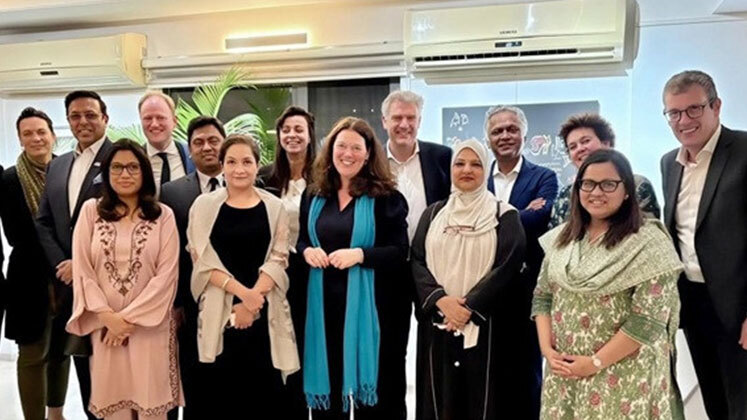
A high-level delegation from Worldly met Vidiya Amrit Khan, Vice-President of the Bangladesh Garment Manufacturers and Exporters Association (BGMEA), on 19th November 2025 at the BGMEA Complex to explore deeper collaboration on impact data and analytics for Bangladesh’s ready-made garment sector.
Worldly is regarded as one of the world’s leading impact-intelligence platforms, used by more than 40,000 global brands and manufacturers. It is the exclusive host of the Higg Index and a key partner of internationally recognised sustainability frameworks such as ZDHC and Bluesign.
The visiting delegation was led by Jay Gaines, Chief Marketing Officer of Worldly, alongside Angela Lee, Director of Regional Supplier Engagement. Their discussions with BGMEA leadership focused on how Bangladesh’s RMG industry can use Worldly’s advanced analytics tools to strengthen factory-level impact measurement and prepare for evolving buyer expectations.
The meeting underscored the growing urgency for reliable and credible data systems, as international buyers increasingly base sourcing decisions on verified impact metrics. With global fashion brands deepening their decarbonisation commitments and tightening traceability requirements, accurate primary data is becoming essential for retaining long-term competitiveness.
During the discussion, Vidiya Amrit Khan stressed the importance of embedding data-driven sustainability across the entire value chain. She said standardised reporting, clear benchmarks and transparent communication of impact performance had become strategic necessities rather than optional ambitions. She noted that Bangladesh has already made major strides in green manufacturing, with more than 200 LEED-certified garment factories — the highest concentration anywhere in the world. However, she added that sustaining this leadership will require further investment in digitalised impact measurement and stronger partnerships with global platforms such as Worldly.
According to the BGMEA, the future growth of Bangladesh’s apparel industry will depend on its ability to demonstrate measurable progress in environmental stewardship, responsible resource management and ethical business practices. Both parties expressed interest in expanding technical engagement and increasing factory participation to ensure RMG suppliers can better align with forthcoming international standards.






